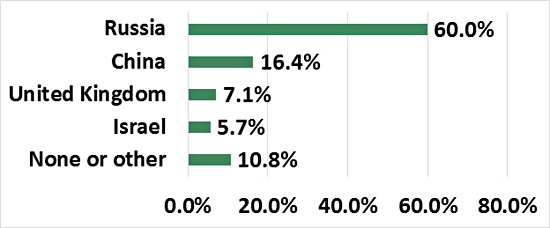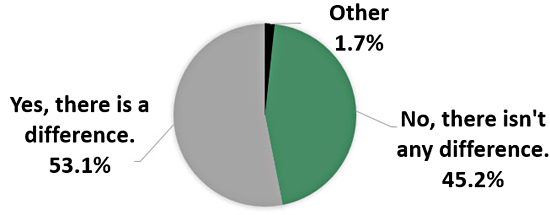Mainstream news coverage of foreign government influence on U.S. elections has been extensive since allegations first surfaced about Russian interference in the 2016 presidential race. According to a new poll, a solid 60.0% majority of Americans now believe Russia is the single top meddler in US elections, followed by China (16.4%) and the United Kingdom (7.1%).
Despite little warranted media coverage, a surprising 5.7% of Americans believe Israel is the single biggest "meddler" in US elections. Why might a swath of voting-age Americans as numerous as the population of the state of New York believe such a thing? One reason may be that nearly half do not appear to believe there is any difference between groups like the American Israel Public Affairs Committee (AIPAC) that claim to lobby for closer foreign government "relations" versus organizations directly lobbying on behalf of foreign governments.
IRmep Poll: Which country do you believe meddles the most in US elections?

Israeli entities do indeed try to meddle. In February the New Yorker reported how the Israeli private intelligence company Psy-Group pitched clandestine services to both the 2016 Trump campaign and other political campaigns. The story revealed Psy-Group even tried to rig a municipal election in California to help preserve a corrupt hospital administration contract. But the New Yorker story generated little follow up.
Such persistent disinterest was noticed August of last year when Noam Chomsky branded the media fascination with Russian interference "a joke" compared to the immense influence Israel wields in America.
"If you’re interested in foreign interference in our elections, whatever the Russians may have done barely counts or weighs in the balance as compared with what another state does, openly, brazenly and with enormous support…Israeli intervention in U.S. elections vastly overwhelms anything the Russians may have done, I mean, even to the point where the prime minister of Israel, Netanyahu, goes directly to Congress, without even informing the president, and speaks to Congress, with overwhelming applause, to try to undermine the president’s policies – what happened with Obama and Netanyahu in 2015… Did Putin come to give an address to the joint sessions of Congress… calling on them to reverse U.S. policy, without even informing the president? And that’s just a tiny bit of this overwhelming influence. So, if you happen to be interested in foreign influence on elections, there are places to look."
If media coverage is scarce, what else may be leading a significant population of Americans to believe Israel is "meddling in American elections?" A likely answer is increasing popular awareness of Israel’s main US lobby, the American Israel Public Affairs Committee (AIPAC) and the view of many Americans that there’s no great difference between a US group like AIPAC claiming to lobby to strengthen "US relations" with foreign governments and organizations lobbying directly for foreign governments.
Big data researchers analyze popular Google search terms in Google Trends to assess public interest over time in important topics such as symptoms of illnesses and possible remedies to pinpoint the outbreak of communicable diseases. Search term language may also reveal racism and personal insecurities in a way no other window into human nature ever has. According to Google Trends, over the past three years AIPAC’s annual policy conference event in Washington and the favoritism of Israel expressed by former UN ambassador Niki Haley and Vice President Mike Pence generated huge nationwide peaks in search interest about the American Israel Public Affairs Committee. Representative Ilhan Omar’s harsh criticisms of AIPAC’s financial sway has also driven ever greater interest as evidenced in search activity.
AIPAC has never welcomed such attention. As former president and chairman of the Board Robert Asher put it back in 1988, "We prefer to stay out of the public eye. We don’t want AIPAC to become the issue." AIPAC has many reasons to want to stay out of the limelight. Among them are its founder’s longstanding ties to and employment by the Israeli government and his startup funding from Israel, the 1962 Kennedy administration umbrella order that AIPAC register as the foreign agent of Israel under the Foreign Agents Registration Act and three separate espionage-related inquiries into the group.
AIPAC never complied with the 1962 order. AIPAC supporters argue it should not have to comply with the Foreign Agents Registration Act because AIPAC does not lobby for the Israeli government, but rather works to "strengthen, protect and promote the U.S.-Israel relationship." This "AIPAC exemption" claim appears as dubious as claims that AIPAC’s congressmember trips to Israel through an affiliated shell organization are "educational trips" rather than "lobbying junkets." According to another poll, a large number of Americans would appear to perceive AIPAC as a cat’s paw of the Israeli government and don’t appear to believe the "AIPAC exemption."
IRmep Poll: Do you see a difference between US organizations lobbying for a foreign government and US organizations lobbying to strengthen US relations with a foreign government?

Almost half – 45.2% of Americans – see no difference between the kind of lobbying AIPAC claims to do in the name of "promoting the relationship" and lobbying directly on behalf of a foreign government.
As popular American interest in AIPAC continues to hit the top of the search chart, many more voters could transcend the fog of the "AIPAC exemption." They will increasingly view unconditional US foreign aid and diplomatic support of Israel as the obvious result of ongoing close coordination between the Israeli government, AIPAC and other entities within the vast U.S.-Israel affinity ecosystem Those who believe such unconditional support of Israel fundamentally undermines the US – as some grand strategists and those opposed to massive foreign aid packages clearly do – Americans may come to view Israeli "meddling" as a much larger and more endemic issue than Russia.
Grant F. Smith is the director of the Institute for Research: Middle Eastern Policy in Washington and the author of the 2016 book, Big Israel: How Israel’s Lobby moves America which is now available as an audiobook. IRmep is co-sponsor of the annual Israel Lobby & American Policy Conference at the National Press Club.




